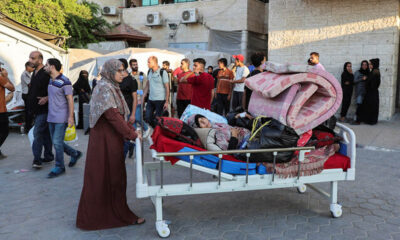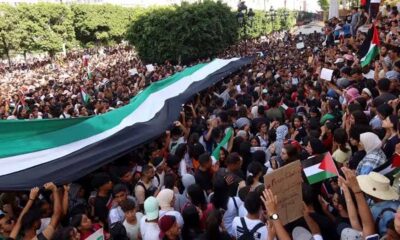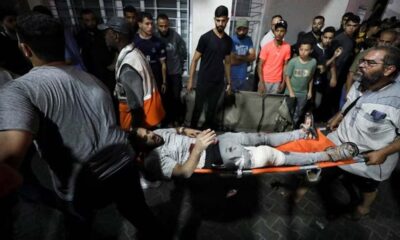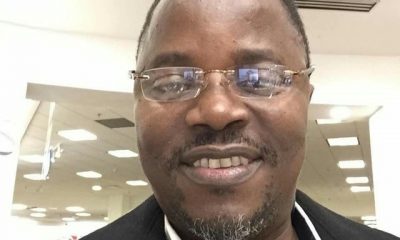International
Mass grave dug at Gaza hospital as humanitarian catastrophe grows
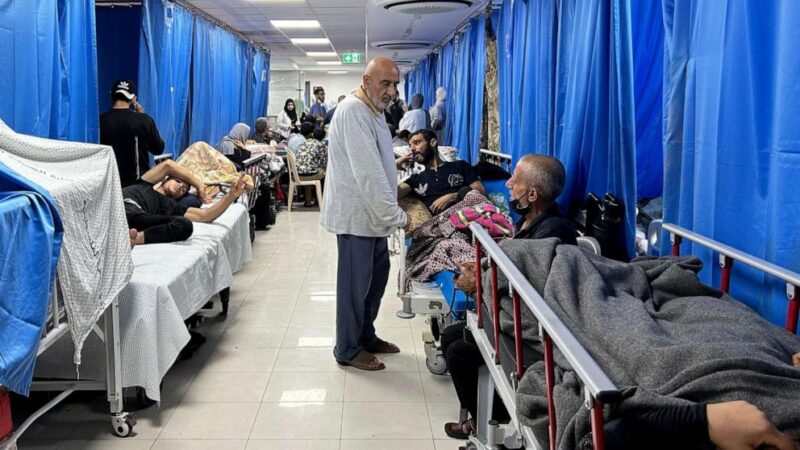
Mass grave dug at Gaza hospital as humanitarian catastrophe grows
The catastrophic humanitarian situation in the Gaza Strip grew worse on Tuesday as much of the focus remained on grim accounts about the state of the collapsed health system after almost six weeks of war between Israel and Gaza’s Hamas rulers.
UN Secretary General António Guterres said he was “deeply disturbed” by the perilous situation at Gaza’s hospitals and, “in the name of humanity,” called for a ceasefire.
Another dire warning came from the UN’s Palestinian relief agency, which said humanitarian operations were grinding to a halt due to the lack of fuel.
In northern Gaza, there was fierce fighting between Israeli soldiers and Palestinian militants around several hospitals.
Attacks on hospitals and a lack of fuel to generate electricity have claimed the lives of several patients in recent days, including newborn babies, according to Palestinian and UN officials.
Around 180 decomposing bodies on the grounds of al-Shifa, the largest hospital in the Gaza Strip, have begun to be buried in a mass grave in a courtyard, according to the Hamas-controlled Ministry of Health.
The account could not immediately be verified.
However, it accorded with descriptions of the situation by the UN’s Office for the Coordination of Humanitarian Affairs, which said on Monday it had heard of about 100 bodies that could not be buried at the hospital.
The World Health Organisation said on Tuesday that al-Shifa Hospital was still in operation, contrary to statements made by health officials at the weekend.
“We call it a functioning hospital because of the heroic efforts of the staff remaining,” WHO spokeswoman Margaret Harris said in Geneva on Tuesday.
Despite the lack of power and attacks, the staff at al-Shifa Hospital are trying everything they can to care for around 700 remaining seriously ill patients. Within the past 24 hours, 20 of those have died, Harris said, referring to figures from the local health authorities.
READ ALSO:
- Avoid political opinion, focus on responsibilities, Oshiomhole urges labour unions
- Barcelona begin European defence with one-sided win
- Telecom sector contributes 16% to Nigeria’s GDP – MTN
The WHO has its own staff in the north of the Gaza Strip, said Harris.
Like the remaining population, they were having problems getting the basic necessities of food and drink.
The al-Shifa Hospital is not only the largest in the Gaza Strip.
Before the recent Israeli attacks, it was also the best-equipped hospital with the most specialised doctors where the seriously ill patients were treated.
Evacuating them would have been difficult even under the best conditions without conflict in the streets, said Harris, but it was impossible in the chaos of the conflict.
In addition, there is no capacity in the south of the Gaza Strip to receive these patients.
“We are begging for a ceasefire,” Harris said.
Street fighting in Gaza City is also preventing emergency workers from responding to calls for help from people trapped under rubble after Israeli bombardments.
People who can no longer get out of their homes and those who need ambulances for the wounded often wait in vain, OCHA reported, citing the Palestinian Red Crescent.
Israel says Hamas is using medical facilities and civilians as “human shields,” with terrorists operating command centres in or under hospitals, including al-Shifa, making them legitimate targets.
On Monday, the Israeli Defense Forces (IDF) said Hamas weapons and explosives were found at al-Rantisi Children’s Hospital after the site was evacuated on Sunday.
Almost 1.6 million of the approximately 2.3 million inhabitants of the sealed-off Gaza Strip have been displaced since the start of the Israeli attacks on October 7.
Many have taken shelter in hospitals.
Israel’s offensive was prompted by massacres carried out by Hamas and other militants in Israel, which killed about 1,200 people.
READ ALSO:
- INEC debunks claims of tampering with Kogi poll results on IReV
- CBN extends validity of old N1000, N500, N200 notes indefinitely
- Nigerian mother of two found dead at home ‘after speaking to her husband, others on phone’
The groups also kidnapped around 240 people and took them to Gaza.
Three people were injured in Tel Aviv on Tuesday after militants in Gaza once again fired rockets at the city. The city was last targeted by rockets from the Palestinian territory on Friday.
The number of Palestinians killed in Gaza has risen to 11,500 since the start of the war on October 7, according to the Hamas-run Health Ministry in Gaza. Some 29,000 people have been injured.
The UN’s main agency in the Gaza Strip said late Tuesday that humanitarian operations were ending due to the lack of fuel.
Israel has not allowed fuel into the territory due to fears it could be used by Hamas fighters.
“The humanitarian response in the Gaza Strip, on which over two million people depend, is gradually coming to an end because no fuel has been allowed into the Gaza Strip since October 7,” UNRWA Commissioner-General Philippe Lazzarini said in a statement.
“It is very simple. Without fuel, the humanitarian operation in Gaza is coming to an end. Many more people will suffer and will likely die,” he said.
The push to free the hostages held by Hamas has made little progress.
The International Committee of the Red Cross said on Tuesday it still had not been granted access by Hamas to see them.
“We have been insisting to see the hostages,” spokeswoman Fatima Sator said in Geneva on Tuesday.
“It is part of our dialogue with Hamas,” she added.
Angry relatives and friends of the hostages are marching almost 70 kilometres from Tel Aviv to Jerusalem, where they are set to arrive on Sunday.
There, they are to march to the official residence of Prime Minister Benjamin Netanyahu, according to organisers.
Only four hostages have been released and one was freed in a military operation.
It is unclear how many of the others are still alive.
Mass grave dug at Gaza hospital as humanitarian catastrophe grows
dpa/NAN.
International
Three girls arrested for attempting to stab mother
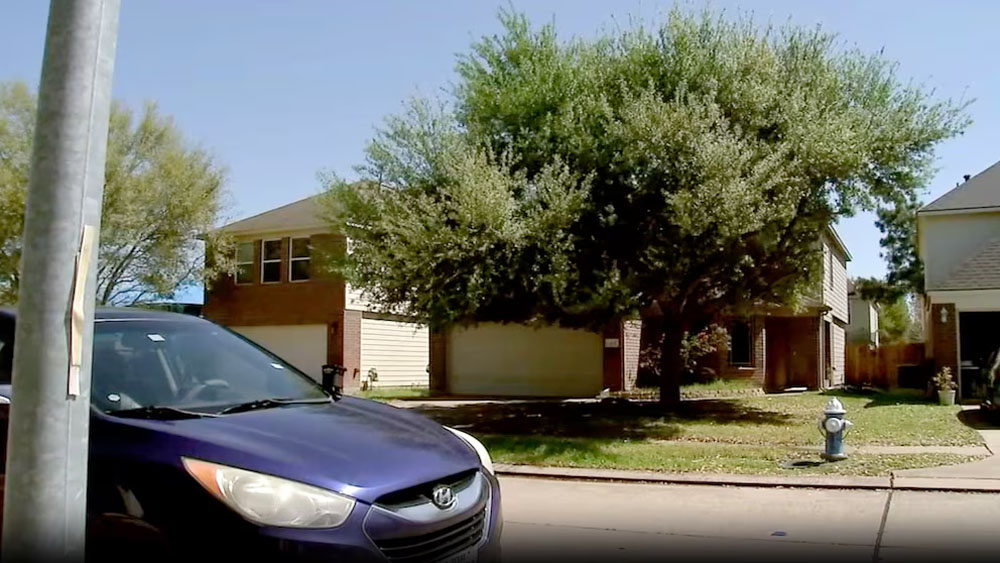
Three girls arrested for attempting to stab mother
Three teenage sisters in Texas have been charged with trying to stab their mom to death for turning off the Wi-Fi.
The sisters, ages just 14, 15, and 16, were busted after chasing their 39-year-old mother from their Houston home late Sunday allegedly bashing her with a brick and then knocking over their grandmother when she tried to stop them, according to Harris County Sheriff Ed Gonzalez.
“The three siblings allegedly coordinated a plan to try and kill the mother,” Gonzalez wrote on X.
READ ALSO:
- Senator Natasha apologises to Oby Ezekwesili over clash with Nwaebonyi
- Just in: Petitioners insist on Natasha’s recall, submit contact list to INEC [PHOTO]
- My husband likes sex too much, wife seeks divorce
“The mother was struck with a brick” and ” In the process, “the grandmother was knocked over while trying to protect” her, the sheriff said, without further identifying any of those involved.
Luckily, both adults escaped serious injury, he said.
All three sisters were arrested and charged with aggravated assault with a deadly weapon and were booked into the Harris County Juvenile facility.
Three girls arrested for attempting to stab mother
International
Canada removes bonus ranking points for job offers in Express Entry system
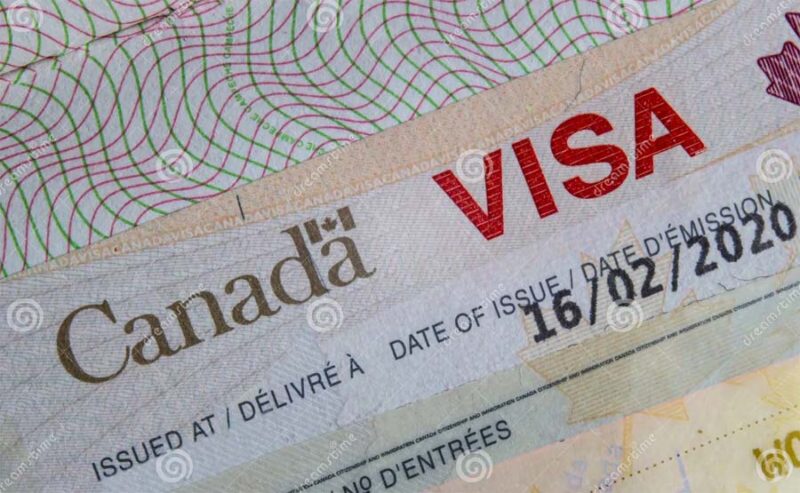
Canada removes bonus ranking points for job offers in Express Entry system
Canada’s Immigration, Refugees and Citizenship Canada (IRCC) has announced that, effective March 25th, 2025, bonus Comprehensive Ranking System (CRS) points for job offers will no longer be awarded to Express Entry candidates.
This change will affect both current candidates in the Express Entry pool and future applicants, impacting the path to permanent residence (PR) for many.
Immigration News Canada (INC) cites that the elimination of these bonus CRS points removes a key advantage for candidates with arranged employment.
Previously, candidates could earn up to 200 additional CRS points for senior management positions and 50 points for other skilled job offers.
These points often helped candidates rank higher in the pool and improve their chances of receiving an Invitation to Apply (ITA) for permanent residence. As of March 25th, 2025, this benefit will no longer be available.
READ ALSO:
- Security operatives stop another pipeline bombing in Rivers
- UNN appoints Prof Olayiwola Usman as first Yoruba DVC (Academics)
- Constitution amendment: Reps move to stop gov’ship election cases at A/Court
Details of the policy update
The policy change applies to both existing candidates and those planning to apply after March 25th. Before the change, candidates with a valid job offer supported by a Labour Market Impact Assessment (LMIA) could earn 200 points for senior management positions and 50 points for other skilled jobs.
- These bonus points were instrumental in propelling candidates to the top of the Express Entry pool, increasing their likelihood of receiving an ITA.
However, with the new policy, these additional points will no longer be awarded. IRCC described this change as a “temporary measure” in a press release dated December 23, 2024, but has not provided a timeline for when or if the bonus points will be reinstated.
- The Ministerial Instructions updated on March 25, 2025, keep the definition of a valid job offer but remove the section that awarded points for them. For candidates who depended on these points, the change takes effect immediately.
Meaning that the updated rules from March 25th, 2025, still explain what counts as a valid job offer, but they no longer give extra points for having one. Candidates who were relying on these points will notice the change right away.
What remains unchanged?
Although the bonus points for job offers will be eliminated, job offers continue to be an important factor for eligibility in certain immigration programs:
- Federal Skilled Trades Program (FSTP): A valid job offer remains a requirement for eligibility.
- Federal Skilled Worker Program (FSWP): Job offers can still help candidates meet minimum eligibility criteria.
- Provincial Nominee Programs (PNPs): Some PNP streams continue to require or benefit from job offers.
However, these job offers will no longer provide additional CRS points, which had previously helped candidates improve their scores.
Reasons behind the change
While the full reasoning behind IRCC’s decision to remove bonus points has not been clearly outlined, reports inform that some possible explanations have emerged.
One theory is that IRCC may be aiming to level the playing field by prioritizing candidates based on factors such as education, language skills, and work experience, rather than those with employer connections.
Another possibility is that the move is a response to concerns over the authenticity of job offers and Labour Market Impact Assessments (LMIAs), though IRCC has not explicitly tied this change to fraud prevention. Economic factors may also be a consideration, as Canada’s labor market evolves and certain industries experience fluctuations in demand for skilled workers.
Impact on candidates
The removal of job offer points will directly affect current candidates in the Express Entry pool. Those who were depending on these bonus points for job offers may see a decrease in their CRS score, which could impact their chances of receiving an ITA in future draws. IRCC has advised applicants to allow several days for their CRS scores to update and to avoid contacting the agency unless discrepancies remain after a week.
For future applicants, the playing field has shifted. Without the bonus points, candidates will need to focus on maximizing other aspects of their profile, such as language proficiency, Canadian education, or work experience, to stay competitive in the pool.
Candidates who have already received an ITA or are in the process of applying for permanent residence will not be affected. Their points from job offers remain unchanged.
What candidates can do now
Candidates seeking to improve their CRS scores can still take steps to strengthen their profiles:
- Enhance language scores: Higher language proficiency can add valuable points.
- Pursue additional education: New qualifications can increase the education score.
- Gain Canadian work experience: This can add up to 200 points.
- Consider Provincial Nominee Programs (PNPs): A provincial nomination can provide 600 points.
- Utilize a spouse’s profile: A partner’s qualifications can add up to 40 points.
As of March 25th, 2025, the immigration process has become more competitive, and candidates will need to adapt to the new system by focusing on other ways to improve their CRS scores. The full long-term effects of this policy change remain to be seen.
Canada removes bonus ranking points for job offers in Express Entry system
nairametrics
International
US to Nigerians: Overstaying visa attracts permanent ban
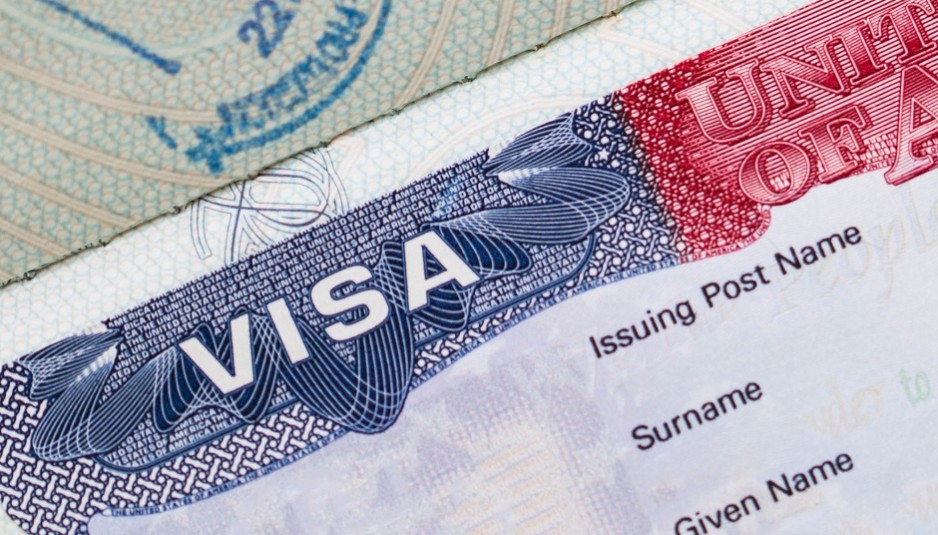
US to Nigerians: Overstaying visa attracts permanent ban
The US government has issued a harsh warning to Nigerian travelers about the serious repercussions of overstaying their visas, underlining that violators may face lifelong bans from re-entering the nation.
The US Mission in Nigeria issued the warning on Monday via its X.
The immigration authorities stressed that consular officials have access to an individual’s entire immigration history, making it practically impossible to dodge sanctions for previous infractions.
They also stated that passengers are responsible for conforming to the restrictions of their visa and that ignorance of visa regulations will not be recognised as an explanation.
“If you overstay your US visa, you could face a permanent ban on travelling to the United States. Consular officers have full access to your immigration history and will know about past violations. There is no such thing as an ‘honest mistake’ – it is your responsibility to use your visa correctly,” the US Mission stated.
READ ALSO:
- Nigerian doctor pioneers W’Africa first robotic prostate cancer surgery
- How 12 inmates escape in Kogi jailbreak – Prison spokesman
- Fubara: Supreme Court reacts to photo of Justice Agim with Wike
It was gathered that those who overstay their visa for more than 180 days but less than a year may face a three-year re-entry ban. If the overstay exceeds one year, the penalty could be a 10-year ban.
Repeat offenders and those with major offences face a permanent lifetime ban.
Since Trump’s return as president, America’s immigration policies have been stricter.
On February 16, 2025, the federal government expressed great concern regarding the deportation of its people from the United States, requesting Washington to follow international treaties and ensure a dignified repatriation procedure.
During a meeting with the US Ambassador to Nigeria, Richard Mills Jr, the Minister of State for Foreign Affairs, Ambassador Bianca Odumegwu-Ojukwu, underlined the emotional and financial hardship that these deportations are putting on Nigerians in the US and their families at home.
Odumegwu-Ojukwu stated that “about 201 Nigerians are currently detained in US immigration centres, with around 85 cleared for deportation,” adding that the government was advocating for a more humane approach to the process.
“With the new US administration in place, we expect commitments to ensure that, if repatriation occurs, it will be done with dignity,” she said.
Odumegwu-Ojukwu emphasised that many Nigerians in the US rely on remittances to support their families and education back home.
She also emphasised that deportations, particularly for those with no violent criminal history, should not be abrupt or traumatic.
“We are asking as a country whether they will be given ample time to handle their assets, or will they just be bundled into planes and repatriated?” She questioned.
US to Nigerians: Overstaying visa attracts permanent ban
-

 metro2 days ago
metro2 days agoAttack on Mufty of Ilorin: Onikijipa Family Charges Stakeholders to Call Sheikh Habibullahi Al-Ilory to Order
-

 metro3 days ago
metro3 days agoCourt refers Ojukwu property case to alternative dispute resolution
-

 Health2 days ago
Health2 days agoNigerian doctor pioneers W’Africa first robotic prostate cancer surgery
-

 metro3 days ago
metro3 days agoCBN rejects Osun nomination of ex-Aregbesola’s commissioner as bank director
-

 metro3 days ago
metro3 days agoRivers: Presidency reveals security intelligence leading to emergency rule
-

 metro2 days ago
metro2 days agoFubara: Supreme Court reacts to photo of Justice Agim with Wike
-

 metro2 days ago
metro2 days agoUNIOSUN mourns as 5 students die in auto crash
-

 metro3 days ago
metro3 days agoShehu Sani faults senators taking voice vote objection to media



